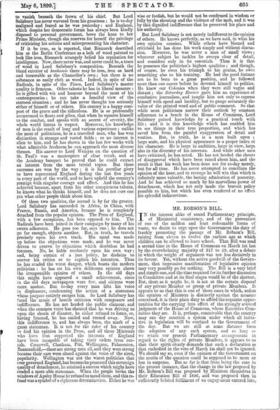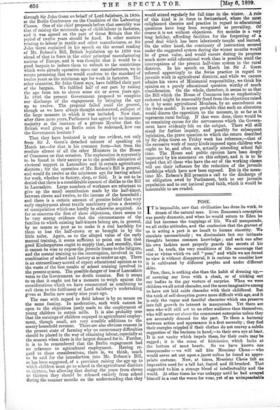MR. ROBSON'S BILL.
IN the interest alike of sound Parliamentary principle, of Ministerial consistency, and of the prevention of one of the saddest and least redeemable forms of waste, we desire to urge upon the Government the duty of frankly promoting the passage of Mr. Robson's Bill, raising from eleven to twelve the earliest age at which children can be allowed to leave school. That Bill was read a second time in the House of Commons on March 1st last by the overwhelming majority of 317 to 59, after a debate in which the weight of argument was not less decisively in its favour. Yet, without the active goodwill of the Govern- ment, that impressive manifestation of legislative opinion may very possibly go for nothing. The Bill is a very brief and simple one, and the time required for its further discussion in Committee and at its final stages would be of the shortest. But, short as it might be, it is not at the certain disposal of any private Member or group of private Members. It appears to us that this is one of those cases in which, unless the opinion of Ministers is distinctly against the measure concerned, it is their plain duty to afford the requisite oppor- tunities for the carrying into effect of the strongly avowed judgment of the House of Commons, whose Executive Com- mittee they are. It is, perhaps, conceivable that the country may one day sanction a system under which all initia- tive in legislation will be confined to the Government of the day. But we are still at some distance from the adoption of any such system, and so long as we retain our present Parliamentary arrangements in regard to the rights of private Members, it appears to us that their spirit clearly demands that such a declaration as that embodied in the vote of March 1st shall not be ignored. We should say so, even if the opinion of the Government on the merits of the question could be supposed to be more or less in suspense. But so far is that from being the case in the present instance, that the change in the law proposed by Mr. Itobson's Bill was proposed by Ministers themselves in their Education Bill of 1896, and was proposed then in sufficiently belated fulfilment of an engagement entered into, through Sir John Gorst on behalf of Lord Salisbury, in 1890, at the Berlin Conference on the Condition of the Labouring Classes. One of the chief proposals before that assembly was that of raising the minimum age of child-labour in factories, and it was agreed on the part of Great Britain that the period of twelve years should be fixed. In other matters i relating to labour n textile and other manufactures, as Sir John Gorst explained in his speech on the second reading of Mr. Robson's Bill, British legislation up to 1890 was ahead of that in force in the other principal manufacturing nations of Europe, and it was thought that it would be a good bargain to induce them to submit to the restrictions which were already operative upon our manufacturers, we in return promising that we would conform to the standard of twelve years as the minimum age for work in factories. The other countries, Sir John Gorst says, have fulfilled their part of the bargain. We fulfilled half of our part by raising the age from ten to eleven some six or seven years ago. In 1896 the present Government proposed to complete our discharge of the engagement by bringing the age up to twelve. The proposal failed amid the general, though as we have always thought undeserved, collapse of the large measure in which it was included. Now that, after three more years, Parliament has agreed by an immense majority at the instance of a private Member that the British word given at Berlin must be redeemed, how can the Government hesitate ?
That they have hesitated is only too evident, not only from Sir J. Gorst's detached manner of speaking on March lst—for that is his common form—but from the resolute silence of all the other Ministers in the House of Commons on that occasion. The explanation is apparently to be found in their anxiety as to the possible alienation of electoral support in Lancashire and in certain agricultural districts ; for the operation of Mr. Robson's Bill is general, and would fix twelve as the minimum age for leaving school for work, whether in factory, shop, or field. It is not to be denied that there is a considerable amount of dislike to the Bill in Lancashire. Large numbers of workmen are reluctant to give up the small contribution made by the half-timer, between eleven and twelve, to the income of the household ; and there is a certain amount of genuine belief that very early employment about textile machinery gives a dexterity of manipulation which can hardly be otherwise acquired. As far as concerns the first of these objections, there seems to be very strong evidence that the circumstances of the families to which existing half-timers belong are, in general, by no means so poor as to make it a real hardship for them to lose the half-crown or so brought in by the little toiler. Again, as to the alleged value of the early manual training, it seems sufficient to point out first that good Kindergartens ought to supply that, and secondly, that it cannot be wise to expose the juvenile frame to the fatigues, and the mental training to the interruption, involved in the combination of school and factory at so tender an age. There is an extraordinary accord of expert educational opinion as to the waste of the best results of school training mvolved in the present system. The possible danger of loss of Lancashire votes to the Government no doubt remains. But it seems to us that it ought not for a moment to weigh against the considerations which we have enumerated as combining to call them to the fulfilment of Lord Salisbury's undertaking given at Berlin now nearly nine years ago.
The case with regard to field labour is by no means on the same footing. In moderation, such work cannot be open to the objections justly made to the employment of young children in cotton mills. It is also probably true that the earnings of children engaged in agricultural employ- ment, though small, are very sensible additions to the scanty household revenue. There are also obvious reasons in the present state of farming why no unnecessary difficulties should be placed in the way of obtaining labour, especially at the seasons when there is the largest demand for it. Further, it is to be remembered that the Berlin engagement had no reference to agricultural employment. Having re- gard to these considerations, there is, we think, much to be said for the introduction into Mr. Robson's Bill, as has been suggested, of a provision raising the age up to which children must go to school in the agricultural districts to thirteen, but allowing that during the years from eleven to thirteen they should be released entirely from school during the summer months on the understanding that they would attend regularly for full time in the whiter. A ,rule of this kind is , in force in Switzerland, where the Most enlightened theories and practice in regard to educational questions have long been recognised as prevailing. Of course it is not without objections. Six months is a -very long holiday, affording facilities for the forgetting of a good deal which has been laboriously taught and learned.. On the other hand, the continuity of instruction secured under the suggested system during the winter months would be of great value and would ensure during its progress much more solid educational work than is possible amid the interruptions of the present half-time system in the rural districts. In his speech on March let Sir J. Gorst referred approvingly to the Swiss practice in regard to juvenile work in agricultural districts, and while we cannot admire his views of Ministerial responsibility, we think his opinion on a purely educational question worthy of much. consideration. On the whole, therefore, it seems to us that the Bill which the House of Commons has so emphatically endorsed might be reasonably freed from the objections raised to it by some agricultural Members, by an amendment on the Swiss model. It seems probable that such an alteration would disarm the opposition to the measure, in so far as it represents rural feeling. If that were done, there would be no remaining excuse for the nervousness which the Govern- ment have evidently felt on the subject. There will still stand for further inquiry, and possibly for subsequent legislation, the grave question to which the return described by Sir John Gorst on Friday week has reference,—that of the excessive work of many kinds imposed upon children who ought to be, and often are, actually attending school fall time. The House and public opinion have been deeply impressed by his statement on this subject, and it is to be hoped that all those who have the ear of the working classes will use their influence for the reduction of the juvenile hardships which have now been exposed. But in the mean- time 3fr. Robson's Bill presents a call to the discharge of an obligation owed by Parliament, both to our juvenile population and to our national good faith, which it would be lamentable to see evaded.







































 Previous page
Previous page